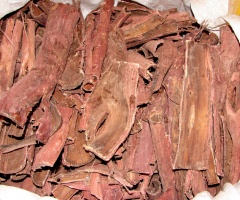Difference between revisions of "Mimosa Extract"
| Line 1: | Line 1: | ||
{{Infobox_Food | {{Infobox_Food | ||
| image = Mimosa_bark.JPG | | image = Mimosa_bark.JPG | ||
| − | | origin = | + | | origin = See text |
| − | | stowage factor = | + | | stowage factor = 2,65 m<sub>3</sub>/t (mimosa bark unpressed bales) |
| humidity and moisture = - | | humidity and moisture = - | ||
| oil content = - | | oil content = - | ||
| ventilation = - | | ventilation = - | ||
| − | | risk factors = | + | | risk factors = See text |
}} | }} | ||
__TOC__ | __TOC__ | ||
Revision as of 10:45, 12 August 2013
| Infobox on Mimosa Extract | |
|---|---|
| Example of Mimosa Extract |  |
| Facts | |
| Origin | See text |
| Stowage factor (in m3/t) | 2,65 m3/t (mimosa bark unpressed bales) |
| Humidity / moisture | - |
| Oil content | - |
| Ventilation | - |
| Risk factors | See text |
Mimosa Extract
Contents
Description
An extract of mimosa or wattle bark, usually shipped in bags. Used in the tanning industry.
Absorbs moisture when the air is humid. Absorption of moisture does not in itself cause damage, but as the extract is soluble in water, excessive wetting may affect the colour and possibly the quality of leather produced. Excessive moisture, excessive heat, lack of suitable ventilation, or excessive superincumbent weight may cause the extract to become soft and exude from the bags and stick to other bags, adjacent cargo or ship’s structure. Faults in manufacture could be responsible for softening. May be subject to loss in weight due to drying out.
Full information on this product is in the process of completion.











